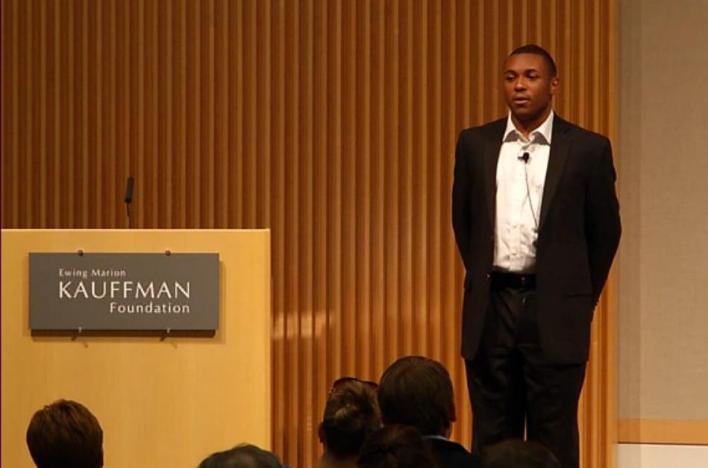Startups seeking to capitalize on the popularity of electronic dance music and grocery store coupons made their pitches at this week’s 1 Million Cups at the Kauffman Foundation.
DropShades founder Harrison Herndon began his presentation by announcing that he was 22 years old and still in college.
“Thank you for letting me skip a Spanish test,” offered Herndon, a Kansas City native who flew in from Fort Worth, Texas, where he attends Texas Christian University.
DropShades are audio-responsive party eyeglasses that light up or “dance” to the beat of music. The glasses use a miniature microphone attached to a signal processor that translates incoming sound across six horizontal bars consisting of LED lights that vertically cascade to the rhythm of music, whether played softly or loudly.
Last May, DropShades asked for $15,000 in its initial Kickstarter campaign. The company eventually took in $78,000 on Kickstarter and found an equity partner to fund the product that is primarily aimed at young male fans of the $4 billion electronic dance music (EDM) industry.
DropShades have a suggested retail price of $49.95 with distribution channels that include the company’s website and both novelty and traditional retailers. But Herndon emphasized the importance of selling DropShades directly to EDM fans at concerts, which is “going to be a huge area of distribution for us,” he said.
Responding to an audience member asking about the possible strobe-effect inducement of seizures in some people who might wear the glasses, Herndon said that “you actually cannot see the light from behind the glasses.”
“The largest complaint we’ve had from customers is that (the glasses) are stolen by their friends,” he said.
CouponCloud founder and CEO Matthew Simrell next talked about his company’s digital coupon processing platform and how it had the power to revolutionize the multi-billion-dollar consumer packaged goods coupon industry.
Simrell referred to the system of paper coupons being collected from customers at stores and shipped elsewhere for scanning and sorting so that retailers can be reimbursed as “completely ridiculous” and “archaic.”
In contrast, Simrell said, CouponCloud’s digital solution was far less expensive for retailers and more efficient for retailers and consumers alike. The company’s platform, he said, “creates a data base of all coupon offers” and “allows consumers to store all coupons within a single account … so all coupons can be redeemed in a single point of purchase.”
In addition, he said, “we actually eliminate over 99 percent of existing (coupon) fraud” with layers of security that tie every coupon transaction to a unique user.
Manufacturers and coupon issuers pay 6 cents per coupon redemption on CouponCloud’s digital platform. The platform is 100 percent free for retailers.
“We completely disrupt a $14 billion industry,” Simrell said. “We make everything better, faster, more effective.”


